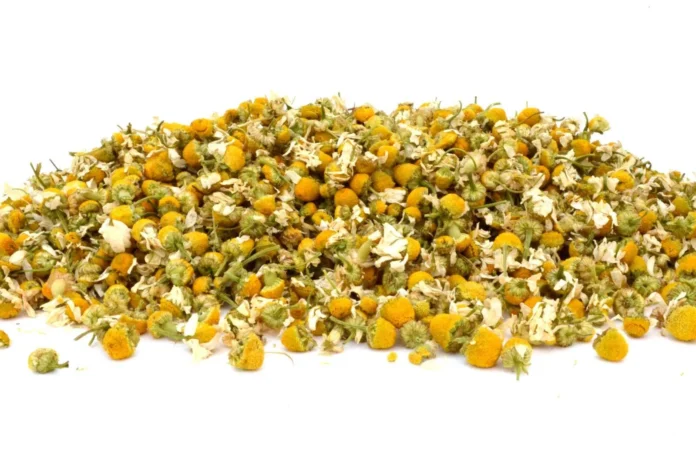
Introduction
Gul-e-Babona, also known as Chamomile (botanical name: Matricaria chamomilla), is a widely recognized plant in both traditional medicine and modern herbalism. Its soothing properties have made it popular for centuries, and it is especially famous for its calming effects, making it a staple in teas, oils, and topical preparations. In this article, we will explore its various forms, the benefits it offers, and its possible side effects.
Forms of Gul-e-Babona (Chamomile)
Gul-e-Babona is used in several forms, each suited for specific applications:

- Chamomile Tea: One of the most common ways of consuming Gul-e-Babona is through tea. The dried flowers are steeped in hot water, allowing the essential oils and compounds to be released. This beverage is favored for its relaxing and mild sedative effects.
- Chamomile Oil: Essential oil extracted from the flowers is used in aromatherapy and as an ingredient in skincare products. It is often diluted before use, as its concentrated form can be potent.
- Chamomile Extract: Available in liquid form, this concentrated extract can be used to create tinctures, added to teas, or applied to the skin for various purposes.
- Capsules/Tablets: For those who prefer not to consume it in liquid or tea form, chamomile is also available as a dietary supplement in the form of capsules or tablets.
- Topical Ointments and Creams: Chamomile’s anti-inflammatory and soothing properties make it a popular ingredient in creams and lotions that are applied directly to the skin for conditions such as eczema or minor burns.
Benefits of Gul-e-Babona (Chamomile)

- Promotes Relaxation and Sleep: One of the most renowned benefits of Gul-e-Babona is its ability to promote relaxation. Chamomile tea is widely used as a natural sleep aid. It contains apigenin, an antioxidant that binds to receptors in the brain to reduce anxiety and initiate sleep. It is particularly beneficial for people suffering from insomnia or anxiety.
- Digestive Aid: Chamomile is often used to support digestion. It can help relieve indigestion, bloating, and gas. Chamomile tea is especially effective for soothing the stomach and calming an upset digestive system, as it reduces inflammation and relaxes the muscles of the gastrointestinal tract.
- Anti-Inflammatory Effects: Chamomile contains several compounds that have potent anti-inflammatory properties. These compounds can help reduce swelling and irritation, making it useful for treating conditions such as arthritis or skin inflammation. It can also relieve muscle spasms.
- Skin Health: Chamomile’s soothing qualities extend to the skin. It has been used in ointments and creams for its ability to calm irritated or inflamed skin. It is commonly applied to wounds, cuts, and burns to accelerate healing and prevent infection. Chamomile’s antimicrobial and antioxidant properties also make it beneficial for reducing acne and promoting overall skin health.
- Boosts Immunity: Some studies suggest that chamomile can enhance the immune system by promoting the production of white blood cells, which help the body fight off infections. Drinking chamomile tea regularly may help prevent colds and other common illnesses.
- Relieves Menstrual Discomfort: Chamomile is often used to ease menstrual cramps and discomfort. Its muscle-relaxant and anti-inflammatory properties can reduce pain and cramping associated with menstruation.
Side Effects of Gul-e-Babona (Chamomile)

Despite its numerous benefits, Gul-e-Babona is not without its side effects. While it is generally considered safe for most people, here are some potential side effects and precautions to keep in mind:
- Allergic Reactions: Some individuals may be allergic to chamomile, especially those who are allergic to other plants in the Asteraceae family (such as ragweed, daisies, or marigolds). Symptoms of an allergic reaction may include skin rash, itching, swelling, or more severe reactions such as anaphylaxis in rare cases.
- Interactions with Medications: Chamomile may interact with certain medications, particularly blood thinners, as it contains compounds that can affect blood clotting. People taking anticoagulants or antiplatelet drugs should consult a healthcare provider before using chamomile. It may also interact with sedatives, increasing their effects and leading to excessive drowsiness.
- Gastrointestinal Issues: While chamomile can aid digestion, in some people, excessive consumption may cause gastrointestinal discomfort such as nausea or vomiting. It’s important to use it in moderation.
- Pregnancy and Breastfeeding: Although chamomile is generally considered safe for most people, pregnant and breastfeeding women should exercise caution. Chamomile has mild uterine stimulating effects, and excessive consumption during pregnancy may increase the risk of miscarriage. Always consult with a healthcare professional before using chamomile during pregnancy or while breastfeeding.
- Drowsiness: Since chamomile is known for its relaxing properties, consuming large amounts may cause excessive drowsiness, especially if combined with other sedative substances. It’s advised to avoid using chamomile if operating heavy machinery or driving.
- Children: While chamomile is generally safe for children in small doses, parents should consult a pediatrician before giving chamomile to children, particularly in concentrated forms like essential oils or extracts.
This Article is for Basic Information. Contact a professional doctor before using it.
HAKEEM KARAMAT ULLAH
+923090560000




